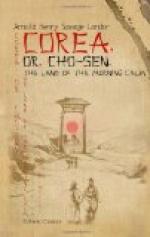The question of religion is always a difficult one to settle, for—no matter where one goes—there are people who are religious and people who are not.
The generality of people in Corea are not religious, though in former days, especially in the Korai-an era, between the tenth and fourteenth centuries, they seem to have been ardent Buddhists. Indeed, Buddhism as a religion seems to have got a strong hold in Cho-sen during the many Chinese invasions; it only passed over Cho-sen, however, like a huge cloud, to vanish again, though leaving here and there traces of the power it once exercised.
The bonzes (priests) had at one time so much authority all over the country as to actually rule the King himself; and, as the reverend gentlemen were ready with the sword as well as with their bead prayer-rosaries, they became an unparalleled nuisance and dangerous to the constitution. After having, by their great power and capacity for agitation, roused the country to revolution and internal disputes, it was found necessary to put them down, and from that time forward, they became mere nonentities. The chief instrument which brought this about was a law, still in existence, by which no religion is, under any circumstances, tolerated or allowed within the walls of Corean cities, and all bonzes are forbidden to enter the gates of any city under pain of losing their heads.
The influence which the priests had gained over the Court having been thus suddenly destroyed, and the offenders against the law in question having been most severely dealt with, Buddhism, so far as Corea was concerned, received its death blow. This was so: first, because, although it had prevailed without restraint for nearly five centuries, many of the primitive old superstitions were still deeply rooted in the minds of the Coreans, and because, with the fall of the priests, these sprang up again bolder than ever; then, too, because the law above-mentioned was so strictly enforced that many temples and monasteries had to be closed owing to lack of sufficient funds, the number of their supporters having become infinitesimal in a comparatively short time.
Shamanism is at the present time the popular religion, if indeed there is any that can be so designated. The primitive worship of nature appears to be quite sufficient for the religious aspirations of the Corean native, and with his imaginative brain he has peopled the earth with evil and good spirits, as well as giving them to the elements, the sky, and the morning star. To these spirits he offers sacrifices, when somebody in his family dies, or when any great event takes place; and to be on good terms with these invisible rulers of his fate is deemed necessary, even by well-educated people who should know better.
There are spirits for everything in Cho-sen. The air is alive with them, and there are people who will actually swear that they have come in contact with them. Diseases of all sorts, particularly paralysis, are invariably ascribed to the possession of the human frame by one of these unwholesome visitors, and when a death occurs, to what else can it be due than to their evil and invisible operation? To old age, to diseases natural and zymotic, the expiration of life is never ascribed; these everlasting evil spirits have to answer for it all.




